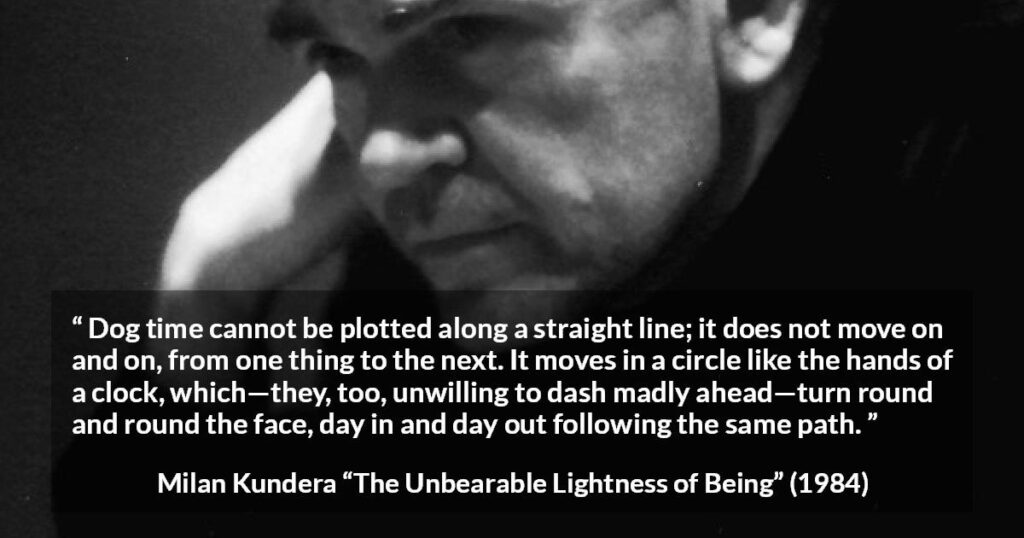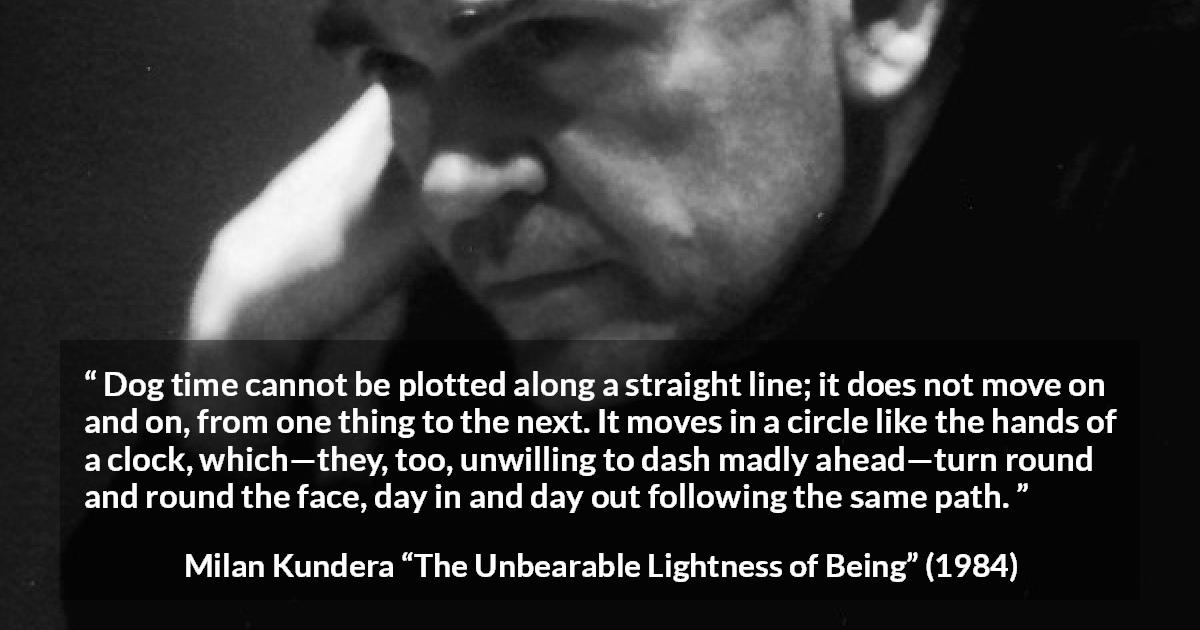
Decoding the Unbearable Lightness of Being Quote: A Deep Dive into Milan Kundera’s Masterpiece
Milan Kundera’s *The Unbearable Lightness of Being* is a novel that has captivated readers for decades, not just for its compelling narrative but also for its profound philosophical explorations. At the heart of this novel lies a constellation of thought-provoking quotes, each offering a window into the characters’ struggles and the larger themes of existence. One particular quote, or rather the essence of the book itself, has become iconic, prompting countless discussions and interpretations. This article delves into the core of this quote, exploring its significance within the context of the novel and its enduring relevance to the human experience. The focus is squarely on the **unbearable lightness of being quote**, examining its nuances and unpacking its philosophical weight.
Understanding the Core Concept: The Unbearable Lightness of Being
The central tenet of Kundera’s work revolves around the concept of the **unbearable lightness of being**. This phrase, which permeates the novel, encapsulates the existential burden of human existence, a burden intensified by the fleeting nature of life and the absence of inherent meaning. It’s a concept that speaks to the weight of responsibility, the consequences of our choices, and the ephemeral quality of joy and suffering. The ‘lightness’ isn’t about joy; it’s about the absence of weight, the lack of consequence, the feeling that everything is ultimately insignificant. This is the core of what the **unbearable lightness of being quote** encapsulates.
Kundera juxtaposes this ‘lightness’ with ‘weight,’ representing the gravity of our actions, the permanence of our experiences, and the significance we ascribe to our lives. The characters grapple with this dichotomy, navigating the complexities of love, betrayal, political turmoil, and the search for personal fulfillment. Understanding the interplay between lightness and weight is crucial to interpreting the **unbearable lightness of being quote**.
The Philosophical Roots: Nietzsche and Parmenides
Kundera’s philosophical framework is deeply rooted in the ideas of Friedrich Nietzsche, particularly his concept of eternal recurrence. Nietzsche posited that if we were to live our lives over and over again, eternally, would we choose to live it the same way? This question weighs heavily on the characters in *The Unbearable Lightness of Being*, forcing them to confront the implications of their actions and the choices they make. The **unbearable lightness of being quote** can be seen as a response to this, a reflection on the dread of repeating the same mistakes, the same joys, the same sorrows, endlessly. The philosophical roots of the **unbearable lightness of being quote** further extend to the pre-Socratic philosopher Parmenides, who explored the nature of being and non-being. Parmenides believed in the immutability of being, a concept that contrasts with the fleeting nature of human experience, a central conflict that Kundera explores.
Character Perspectives: Navigating Lightness and Weight
The novel’s characters, Tomas, Tereza, Sabina, and Franz, each embody different perspectives on the **unbearable lightness of being**. Tomas, the protagonist, wrestles with the conflict between his physical desires and his emotional commitments. He embodies the lightness, flitting between relationships with little regard for the lasting consequences. Tereza, on the other hand, represents the weight, seeking permanence, love, and a sense of belonging. Sabina, with her artistic inclinations and rebellious spirit, embraces lightness, rejecting the constraints of societal norms and personal attachments. Franz, a complex character, searches for meaning in his life and struggles to find a balance between love and freedom. Their individual journeys, marked by love, loss, and political upheaval, illuminate the various facets of the **unbearable lightness of being quote**.
Tomas and the Weight of Responsibility
Tomas’s character arc is a prime example of the struggles associated with the **unbearable lightness of being**. His initial inclination toward freedom and detachment clashes with the profound emotional needs of Tereza. His choices, seemingly light and inconsequential at first, accumulate weight over time, impacting the lives of those around him. His eventual acceptance of responsibility, born out of his love for Tereza, demonstrates the potential for finding meaning even within a world devoid of inherent purpose.
Tereza and the Burden of Love
Tereza represents the struggle with the weight of existence. She seeks a deeper meaning and a sense of belonging, a contrast to Tomas’s lightness. Her love for Tomas anchors her, but it also subjects her to profound emotional turmoil. Her journey reveals the inherent burden of love, the vulnerability that comes with connection, and the ongoing negotiation between the desire for lightness and the craving for depth. The **unbearable lightness of being quote** reflects her struggle to find a place of security and significance in a world characterized by ephemerality.
Sabina and the Embrace of Freedom
Sabina embodies the embrace of lightness. She rejects constraints and societal expectations, valuing freedom above all else. Her artistic pursuits and her relationships are characterized by a sense of detachment, a deliberate avoidance of emotional weight. However, even in her pursuit of lightness, Sabina grapples with the complexities of human connection and the limitations of a life devoid of deep attachments. Her perspective helps to illuminate the multifaceted nature of the **unbearable lightness of being quote**.
Franz and the Quest for Meaning
Franz, Sabina’s lover, navigates a different path. He searches for meaning and connection, struggling to reconcile his intellectual pursuits with his emotional needs. He embodies the human desire to find purpose in a world that often seems indifferent. His journey reflects the quest for meaning, the conflict between the search for connection and the allure of freedom, and how the **unbearable lightness of being quote** reflects the tension between these forces.
The Political Context: Prague Spring and Its Influence
The novel is set against the backdrop of the Prague Spring and the Soviet invasion of Czechoslovakia. This political turmoil adds another layer of meaning to the **unbearable lightness of being quote**. The characters’ struggles with personal freedom and societal constraints mirror the broader political struggle for autonomy and self-determination. The weight of political oppression and the struggle for individual liberty are interwoven with the characters’ personal dilemmas, highlighting the interconnectedness of the individual and the collective experience. The events of the Prague Spring directly influenced the themes of the **unbearable lightness of being quote**, emphasizing the importance of individual agency and the consequences of political choices.
The Enduring Relevance of the Quote
The **unbearable lightness of being quote** continues to resonate with readers because it speaks to universal human experiences. The themes of love, loss, freedom, responsibility, and the search for meaning are timeless. The novel’s exploration of these themes provides a framework for understanding our own lives and the choices we make. In a world often characterized by uncertainty and transience, the **unbearable lightness of being quote** offers a profound reflection on the human condition. It challenges us to consider the implications of our actions, the weight of our choices, and the search for meaning in a world that often feels indifferent.
Analyzing Specific Quotes and Their Meaning
While the book itself is the quote, exploring specific passages and their context can further illuminate the central theme. Kundera’s prose is rich with observations about human behavior and the nature of existence. Analyzing these specific quotes is a crucial step in understanding the **unbearable lightness of being quote**.
Quote 1: The Heavy/Light Dichotomy
Kundera often explores the dichotomy between the ‘heavy’ and the ‘light.’ He writes about the burden of responsibility, the permanence of actions, and the desire for meaning. These observations contribute to the understanding of the **unbearable lightness of being quote**.
Quote 2: The Importance of Choice
The novel emphasizes the importance of our choices and their consequences. The characters grapple with the weight of their decisions, revealing the complexities of human relationships. This highlights a key aspect of the **unbearable lightness of being quote**.
Quote 3: The Search for Love and Meaning
The characters’ search for love and meaning is a central theme. They seek connection, purpose, and a sense of belonging. This struggle reflects the human desire to find significance in a world that often feels indifferent, directly linking to the **unbearable lightness of being quote**.
Conclusion: The Enduring Power of Kundera’s Vision
The **unbearable lightness of being quote**, as a concept, isn’t just a catchy phrase; it’s a profound meditation on the human condition. Kundera’s novel invites us to contemplate the complexities of our existence, the weight of our choices, and the fleeting nature of life. By exploring the interplay between lightness and weight, Kundera offers a nuanced perspective on love, loss, freedom, and responsibility. The book encourages us to confront the challenges of living in a world without inherent meaning and to find our own sense of purpose. The enduring power of this work lies in its ability to provoke thought, inspire introspection, and remind us of the profound beauty and fragility of the human experience. The **unbearable lightness of being quote** continues to resonate, challenging us to reflect on our own lives and the choices that shape them. [See also: The Philosophical Influence on Kundera’s Work] [See also: Exploring Themes of Love and Loss in Literature] [See also: The Impact of Political Turmoil on Artistic Expression] [See also: Existentialism in Modern Literature] [See also: Key Characters in *The Unbearable Lightness of Being*]
The **unbearable lightness of being quote** is a starting point. The novel is about the journey, the complexities, and the search for meaning in a world that often feels chaotic. Understanding the context, the characters, and the philosophical underpinnings of the **unbearable lightness of being quote** is key to appreciating the depth and richness of Kundera’s masterpiece.


